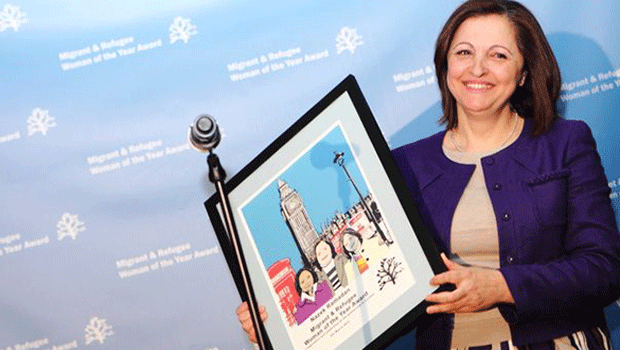“It is always difficult to make the decision to leave your country, to move on and live somewhere else. You take your children and leave your home, family, all your memories and your previous life behind you and look for a new life, a new beginning.” Ms Ramadan, UNITEE’s New European of the Month, recalls her difficult decision to flee Lebanon torn by civil war in the 1980s for a new life in the United Kingdom.
For many migrants who have settled in Europe, it is a challenge to be well-adapted and well-represented in a new environment where they are often regarded as a minority and are given little attention or priority in political, economic, cultural, and social matters.
Our New European of the month has a first-hand experience as a migrant and as a civil war refugee on how migrants are being discriminated and the difficulties they experience while living, studying, working, or doing business in Europe.
Originally from Lebanon, she was born and raised in Beirut. While the country was being torn apart by a civil war, Ms Ramadan opened her Beirut home to many refugees. As the conflict in her beautiful, beloved Lebanon worsened, she eventually fled to London in 1986 with her family.
“The biggest barrier for me was the language. I had to learn English. I also had to learn about my new home, the culture, the people, the way of life, the system. I needed to understand more about this country which is going to be my home for the unforeseeable future. 28 years later I am still here.”
Ms Ramadan has been living in the United Kingdom for 28 years and has dedicated her life to enriching the lives of migrants, refugees, asylum seekers, and ethnic minorities in the country for many years. Aside from being a social entrepreneur, she is also a devoted wife to a journalist husband and a loving mother to her son and daughter.
While learning English, she started doing community work: from volunteering for her children’s school to joining organisations that addressed the concerns of migrants.
“Before the last general elections in the UK in 2010, the debate on migration became very negative. Migration was presented in the UK as a problem. Everyone was talking about migrants except migrants themselves. So my colleagues and I decided that maybe it’s about time we engage in the debate on migration. Maybe it’s about time we become part of this conservation taking place about us but without us.”
In 2010, Ms Ramadan and her colleagues founded Migrant Voice, a migrant-led organisation that gives migrants a voice through the media and encourages them to become more active citizens in Britain. She is also the editor-in-chief for the organisation’s newspaper and the founder of the very first refugee newspaper in London, “The New Londoners”.
“We trained ourselves in talking to the media, how the media works, and how to get started in the media. We started contacting and building a relationship with journalists. We started to build our confidence and developed our strategy to engage with the public, the media, and policy makers. We taught this was the only way to change things, to become active and to talk about us.”
Her work with Migrant Voice involves providing the organisation’s members with trainings that develop the skills and confidence they need when it comes to utilising media for informing, educating, and encouraging both migrants and native Brits to discuss about issues that concern migrants and the British community.
Because of her genuine concern and efforts for bettering the lives of New Europeans in the UK, Ms Ramadan was awarded the very first Migrant and Refugee Woman of the Year Award in 2012.
Her life-long goal to create positive change in the lives of migrants has spread throughout the UK in the last two decades. Her four-year-old organisation now has an office in London, Birmingham, and Glasgow.
Ms Ramadan has also partnered with the European Union and other organisations in the UK and in other European countries in several international projects and initiatives.
“The more diverse a city is, the more successful a city is. I think diversity is what makes a country or city more interesting, more exciting.” Ms Ramadan believes in the potential of New Europeans and diversity in contributing to productive growth in Europe.
“I am in the UK. I think I am fully integrated in the UK. But I still have a lot of my Lebanese roots. Part of my Lebanese identity is still with me. It does not contradict with my new British identity. It makes it richer, more interesting, more exciting, more colourful.”
Home is where the heart is. For Ms Ramadan, being Lebanese and a New European are both close to her heart. Lebanon and the UK are her two homes. She sees the integration of New Europeans to their country of residence as an opportunity for a better, more inclusive Europe.


Leave a Reply